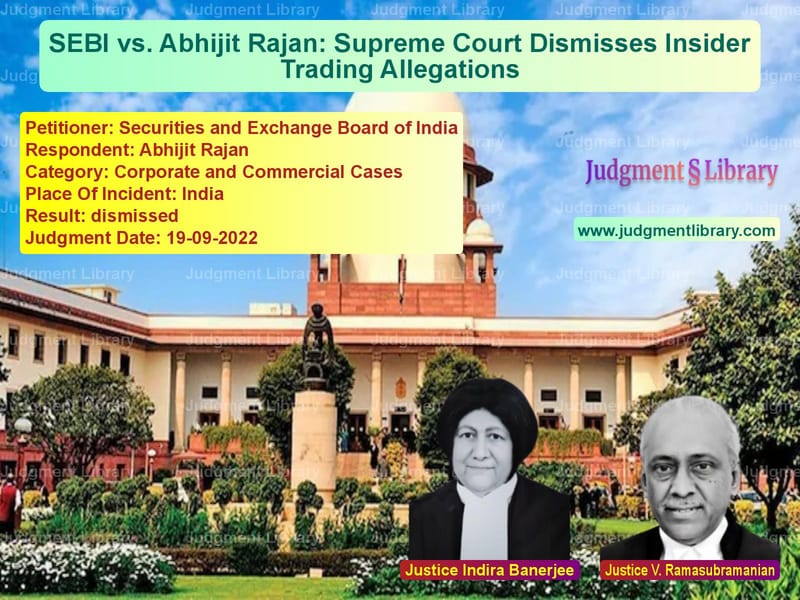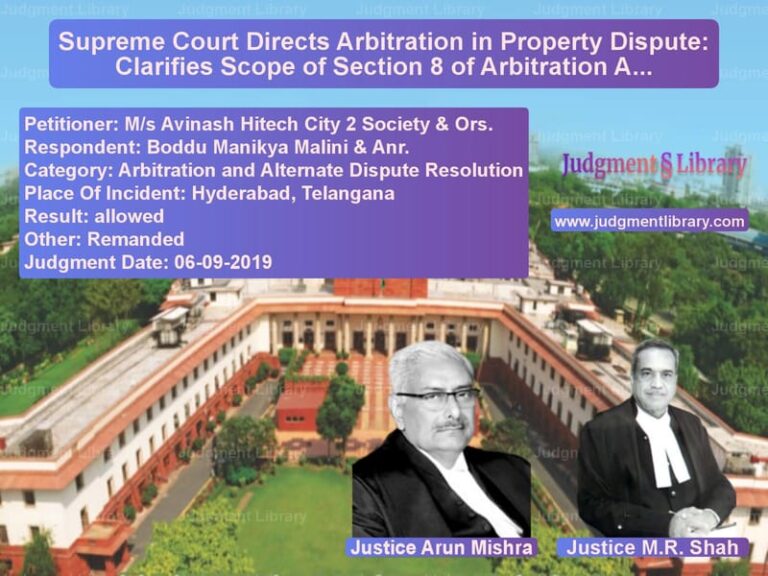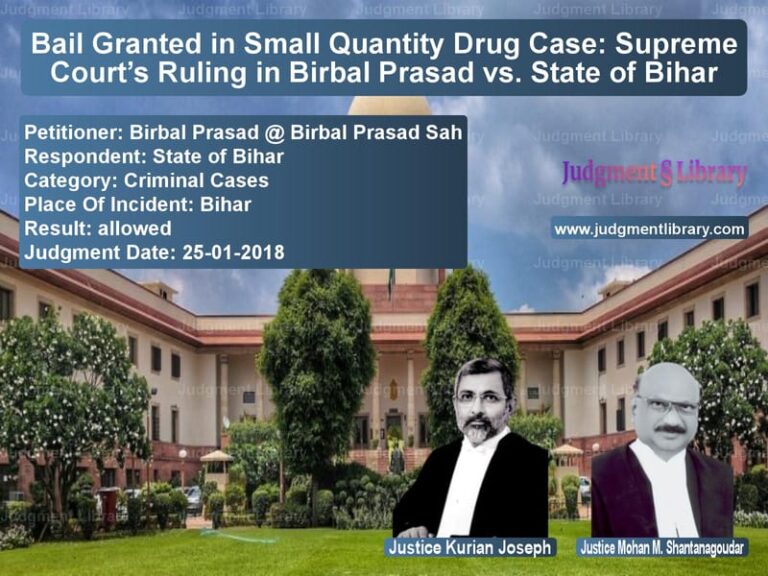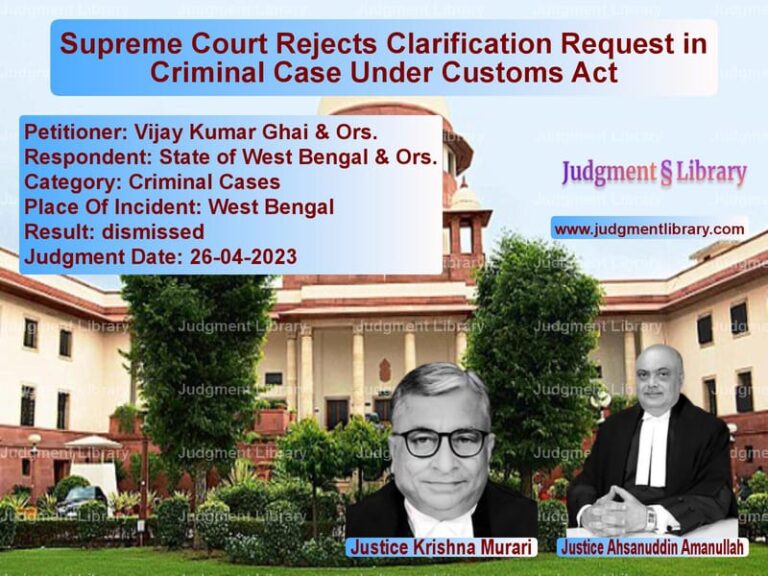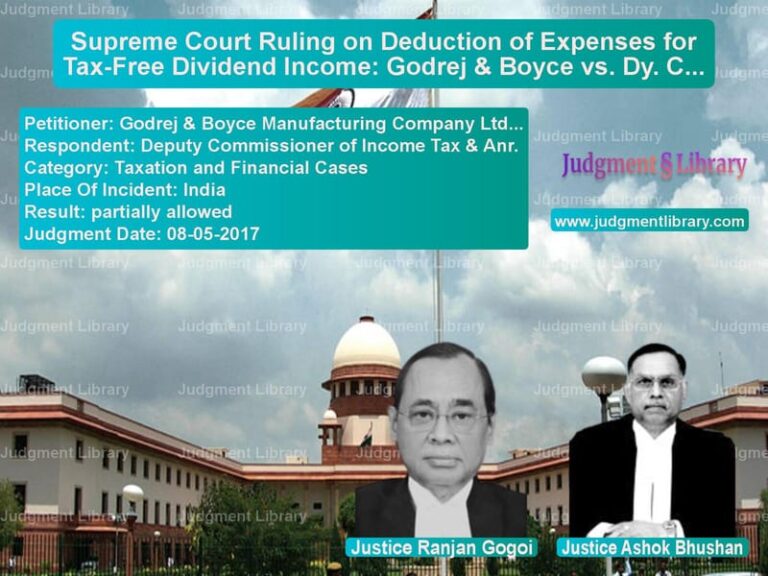SEBI vs. Abhijit Rajan: Supreme Court Dismisses Insider Trading Allegations
The Supreme Court of India has delivered a crucial judgment in the case of Securities and Exchange Board of India (SEBI) vs. Abhijit Rajan, addressing allegations of insider trading. SEBI had accused Abhijit Rajan, the former Chairman and Managing Director of Gammon Infrastructure Projects Limited (GIPL), of insider trading by selling shares before the public disclosure of material information. The Securities Appellate Tribunal (SAT) ruled in favor of Rajan, and SEBI challenged this ruling before the Supreme Court. The apex court upheld SAT’s decision, dismissing SEBI’s allegations.
Background of the Case
Abhijit Rajan was the Chairman and Managing Director of GIPL until September 20, 2013, after which he continued as a director. GIPL had entered into two shareholders’ agreements with Simplex Infrastructure Limited (SIL) to invest in each other’s infrastructure projects. Under the agreements, GIPL was to invest in Maa Durga Expressways Private Limited (MDEPL), a special purpose vehicle of SIL, while SIL was to invest in Vijayawada Gundugolanu Road Project Private Limited (VGRPPL), a special purpose vehicle of GIPL.
On August 9, 2013, the board of GIPL passed a resolution authorizing the termination of both agreements. On August 22, 2013, Abhijit Rajan sold approximately 144 lakh shares of GIPL, valued at ₹10.28 crores. On August 30, 2013, GIPL publicly disclosed the termination of the agreements to the stock exchanges. SEBI alleged that Rajan engaged in insider trading by selling shares before this disclosure, thereby avoiding a loss of ₹85 lakhs.
Legal Proceedings
SEBI’s Allegations
SEBI argued that:
- The termination of the shareholders’ agreements was unpublished price-sensitive information (UPSI) under Regulation 2(ha) of SEBI (Prohibition of Insider Trading) Regulations, 1992.
- Rajan, as an insider, had access to this information and sold shares before it was publicly disclosed.
- The transaction violated Section 12A(d) and (e) of the SEBI Act, 1992.
- Rajan made unlawful gains by selling his shares before the disclosure.
- SEBI ordered Rajan to disgorge ₹1.09 crores as alleged unlawful gains.
Rajan’s Defense
Rajan contended that:
- The termination of the agreements was not price-sensitive, as the investment involved only ₹4.9 crores—just 0.05% of GIPL’s order book value.
- He urgently needed funds for Gammon India Limited’s Corporate Debt Restructuring (CDR) package and had to sell shares.
- The disclosure of the contract termination did not negatively impact GIPL’s share price.
- SEBI’s calculation of unlawful gains was based on incorrect assumptions.
Supreme Court’s Observations
The Supreme Court analyzed the following key legal issues:
1. Was the Information “Price-Sensitive”?
The Court ruled that for information to be unpublished price-sensitive information (UPSI), it must materially affect share prices. The termination of agreements did not have such an impact, as GIPL actually gained full control over a ₹1648 crore project, strengthening its financial position.
2. Did Rajan Engage in Insider Trading?
The Court held that insider trading requires an intention to exploit unpublished information. In this case, Rajan’s sale of shares was driven by financial distress due to the CDR package, not an attempt to gain from the market. The Court stated:
“If a person enters into a transaction which is surely likely to result in loss, he cannot be accused of insider trading.”
3. Did SEBI Err in Its Calculation of Gains?
The Court criticized SEBI’s methodology for determining unlawful gains, stating that SEBI arbitrarily chose the stock price on a particular date to calculate Rajan’s supposed advantage.
Final Verdict
The Supreme Court dismissed SEBI’s appeal, ruling that:
- The termination of agreements was not UPSI.
- Rajan’s share sale did not constitute insider trading.
- SEBI’s disgorgement order was unwarranted.
Conclusion
This judgment reinforces that insider trading requires clear proof of an individual using confidential information for personal gain. The Court emphasized that regulatory authorities must assess market impact objectively rather than rely on speculative price movements.
Petitioner Name: Securities and Exchange Board of India.Respondent Name: Abhijit Rajan.Judgment By: Justice Indira Banerjee, Justice V. Ramasubramanian.Place Of Incident: India.Judgment Date: 19-09-2022.
Don’t miss out on the full details! Download the complete judgment in PDF format below and gain valuable insights instantly!
Download Judgment: securities-and-excha-vs-abhijit-rajan-supreme-court-of-india-judgment-dated-19-09-2022.pdf
Directly Download Judgment: Directly download this Judgment
See all petitions in Corporate Governance
See all petitions in unfair trade practices
See all petitions in Company Law
See all petitions in Judgment by Indira Banerjee
See all petitions in Judgment by V. Ramasubramanian
See all petitions in dismissed
See all petitions in supreme court of India judgments September 2022
See all petitions in 2022 judgments
See all posts in Corporate and Commercial Cases Category
See all allowed petitions in Corporate and Commercial Cases Category
See all Dismissed petitions in Corporate and Commercial Cases Category
See all partially allowed petitions in Corporate and Commercial Cases Category

